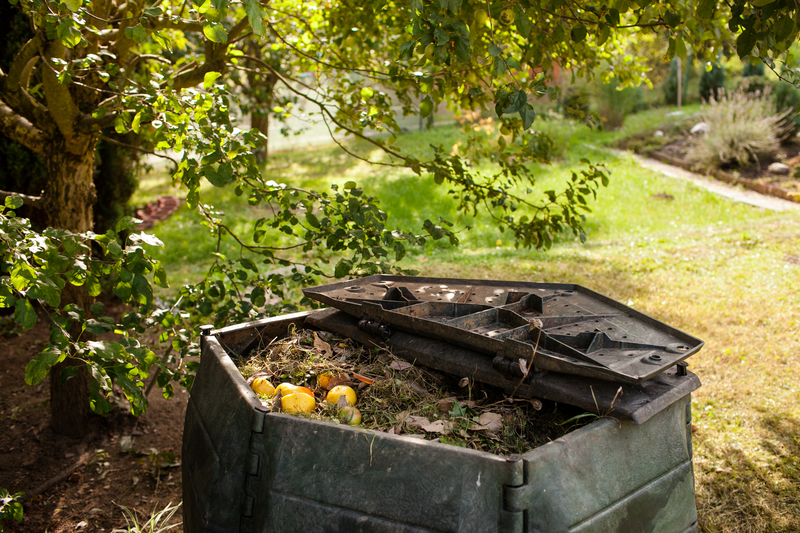Revolutionize the Way You Recycle With Our Practical Advice
Have you ever wondered if you could do more for the environment? Recycling has come a long way, but with a few simple tweaks, you can easily transform your recycling habits and make a big difference. In this comprehensive guide, we provide you with actionable, practical recycling advice to help you revolutionize the way you recycle at home, at work, and in your community. Let's explore how you can optimize your recycling routine for a greener tomorrow!

Why Is It Important to Rethink Recycling?
Many of us think that simply tossing items into the recycling bin is enough. However, the reality is that efficient recycling requires more attention. Every year, millions of tons of recyclable materials end up in landfills due to contamination, lack of knowledge, or insufficient recycling systems.
- Reduce Environmental Impact: Proper recycling saves resources, reduces greenhouse gas emissions, and decreases the amount of waste in landfills.
- Conserve Natural Resources: Recycling helps conserve resources like wood, water, and minerals.
- Boost Economy: A robust recycling system creates jobs and reduces costs in raw material extraction and processing.
With these benefits in mind, isn't it time to reinvent your recycling habits and contribute to a cleaner environment?
Get Started: Essential Steps to Overhaul Your Recycling Routine
1. Learn What Can and Cannot Be Recycled
Every region has slightly different guidelines when it comes to recycling. Start by checking your local municipality's website or recycling center for the most up-to-date information. Knowledge is power!
- Papers: Newspapers, magazines, printer paper, and cardboard are almost always accepted.
- Plastics: Look for the recycling symbol and numbers (usually 1-7). Bottles, jugs, and containers are widely accepted, while plastic bags and wrap generally are not.
- Metals: Aluminum cans, tin cans, and some foil materials can be recycled, but remember to rinse them first.
- Glass: Beverage bottles and food jars are commonly accepted.
- What to avoid: Food-soiled materials, pizza boxes, light bulbs, ceramics, and certain plastics.
2. Reduce Contamination: Rinse and Prepare Your Recyclables
One of the biggest challenges in recycling is contamination. Food residue can spoil an entire batch of recycled materials. To revolutionize recycling at home, follow these simple practices:
- Rinse: Give cans and containers a quick rinse before recycling.
- Remove Lids: Separate lids from bottles and jars--they're often made from different materials.
- No Bags: Put recyclables straight into the bin, not in plastic bags, unless your facility specifically requests it.
Innovative Tips to Transform Your Recycling Habits
1. Set Up an Effective Sorting Station
Having a dedicated recycling station at home or in the office can make all the difference. Label separate bins for paper, plastics, metals, and glass to streamline the sorting process. Make it visually appealing and easy to access--so the entire family or team is motivated to use it regularly.
- Color-Coding: Assign a color to each recycling bin for quick recognition.
- Clear Instructions: Post signs or pictures showing what goes where.
- Regular Emptying: Avoid overflow and odors by emptying bins frequently.
2. Repurpose and Reuse Before Recycling
Remember, the three R's--Reduce, Reuse, Recycle. Sometimes reusing is even better than recycling because it saves additional resources required for processing. Before tossing items in the recycling bin, ask yourself:
- Can glass jars become storage containers?
- Can cardboard boxes be reused for moving or organizing?
- Can old clothes become cleaning rags?
Get creative! Reinvent your recycling routine by finding ways to extend the life of everyday items before disposing of them.
3. Compost Organic Waste
Did you know that up to 30% of household waste is organic and can be composted? Composting transforms fruit and vegetable scraps, coffee grounds, and yard debris into nutrient-rich soil for your garden.
- Set up a designated compost bin in your kitchen.
- Avoid meat, dairy, and oily foods as they attract pests.
- Turn your compost pile regularly to aerate and speed up decomposition.
Healthy composting not only diverts waste from landfills but also enriches your garden's productivity.
4. Recycle Electronics Responsibly
Electronic waste (e-waste) is one of the fastest-growing types of global waste. But recycling it isn't as simple as putting it in the curbside bin.
- Check with local e-waste collection centers or retailers that accept old electronics.
- Remove all personal data from devices before recycling them.
- Never dispose of batteries, phones, or computers in the regular trash.
Proper e-waste recycling recovers valuable materials like copper and gold while keeping toxic substances out of landfills.
5. Buy Products Made From Recycled Materials
Your purchasing habits can close the recycling loop. Look for products labeled "made from recycled content" or those that use eco-friendly packaging. By creating demand for these products, you're supporting the entire recycling ecosystem.
- Choose 100% recycled paper for printing and tissues.
- Buy reusable bags and water bottles made from recycled plastics.
- Select clothing from brands that repurpose fibers and fabrics.
Small changes in your buying habits can significantly contribute to a stronger, more sustainable recycling economy.
Take Recycling Beyond the Bin: Community Engagement
1. Educate Your Family and Friends
Knowledge-sharing is a powerful tool in revolutionizing recycling. Share what you've learned with your loved ones to help prevent common recycling mistakes.
- Host a recycling workshop or information night at your home or local community center.
- Post reminders near recycling bins to ensure correct sorting.
- Encourage kids to participate and learn through recycling games and challenges.
2. Partner With Local Organizations
Many communities have local environmental groups or recycling task forces. By getting involved, you can help organize cleanup events, collection drives, or lobbying for better municipal recycling programs.
- Join or start a recycling committee at your school or workplace.
- Promote proper recycling at community events and fairs.
- Volunteer at local recycling facilities to gain hands-on experience.
3. Advocate for Better Recycling Policies
Sometimes, individual action isn't enough. Contact your local government to advocate for improvements in recycling infrastructure. Ask for more drop-off centers, curbside pickup, or education campaigns.
- Sign petitions supporting extended producer responsibility (EPR) laws.
- Speak up at city council meetings.
- Encourage businesses to use recyclable packaging.
Common Recycling Mistakes and How to Avoid Them
Even the most eco-conscious individuals sometimes get recycling wrong. Here are the top mistakes and how to avoid them:
- Bagging Recyclables: Don't put items in plastic bags unless directed by your recycling service.
- Wishcycling: Placing non-recyclable items in the bin "just in case"--it does more harm than good.
- Dirty Recyclables: Food residue can ruin entire recycling batches.
- Ignoring Local Guidelines: Each community has its own rules--educate yourself!
Avoid these pitfalls to maximize your positive impact and truly revolutionize the way you recycle.
Technology's Role in Revolutionizing Recycling
1. Recycling Apps and Tools
Modern technology offers countless ways to make recycling easier. Try these digital resources:
- Recycling locator apps help you find nearby collection centers for electronics, hazardous waste, and more.
- Barcode scanning apps provide instant information about how to recycle a product.
- Online forums connect you with local recycling enthusiasts for tips and support.
2. Smart Bins and Automation
Some communities and businesses have started using smart recycling bins equipped with sensors to sort materials automatically or alert collectors when bins are full. This reduces contamination and increases collection efficiency.
3. Industrial Innovations
The future of recycling is bright, thanks to robotics, artificial intelligence, and chemical recycling that can break down traditionally hard-to-recycle items into their basic elements.
- Robotic sorters in facilities can distinguish between different plastics and metals.
- AI algorithms help optimize collection routes and reduce resource use.
- Chemical recycling breaks down plastic into reusable raw materials.

Frequently Asked Questions: Transforming Your Recycling Habits
1. What is the most important thing I can do to improve my recycling?
Stay informed! Recycling rules change frequently. Monitor local guidelines and always make sure your recyclables are clean and properly sorted.
2. How can I start recycling electronics at home?
Look for certified e-waste programs in your area or drop-off events. Some gadget retailers and manufacturers offer take-back programs. Always erase personal data before recycling.
3. Is it better to recycle or to reuse?
Reusing is usually better where possible, as it reduces demand for new materials and energy spent on recycling.
4. My city doesn't recycle certain plastics -- what can I do?
Check for local drop-off centers or TerraCycle programs that accept hard-to-recycle plastics. Reduce your use or advocate for better municipal recycling.
Conclusion: Step Into the Future of Sustainable Recycling
Revolutionizing the way you recycle isn't about being perfect--it's about continuous improvement and making smarter choices every day. By following our practical recycling tips, learning local guidelines, avoiding contamination, and engaging your community, you can create measurable change for the planet.
- Stay curious: Keep learning about new recycling technologies and opportunities.
- Get involved: Teach others and participate in local initiatives.
- Be proactive: Advocate for better waste management policies in your area.
Together, we can revolutionize recycling habits worldwide. Start with one small change today, and watch your impact grow. The earth--and future generations--will thank you for it.